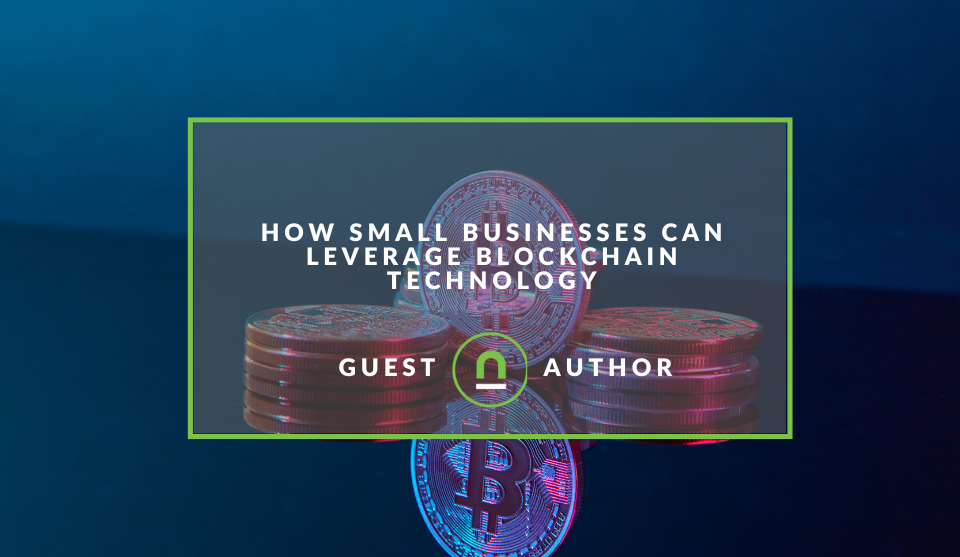Recent posts

Money Talks
Everything You Need to Know About SASSA Status Check
13 April 2025

Mind, Body & Soul
The Genetic Diversity of Cannabis Seeds
12 April 2025

Money Talks
How Small Businesses Can Leverage Blockchain Technology
02 April 2025

Industry Experts
Mastering Personalization in Digital Marketing
31 March 2025
Popular posts
Extravaganza
Trending Music Hashtags To Get Your Posts Noticed
24 August 2018
Geek Chic
How To Fix iPhone/iPad Only Charging In Certain Positions
05 July 2020
Extravaganza
Trending Wedding Hashtags To Get Your Posts Noticed
18 September 2018
Money Talks
How To Find Coupons & Vouchers Online In South Africa
28 March 2019
How Small Businesses Can Leverage Blockchain Technology
02 April 2025 | 1 comments | Posted by Nicholas Tay in Money Talks
To most people, blockchain is Bitcoin and other digital currencies. While that association is not inaccurate, it really only just begins to touch on all the things blockchain can do—particularly for small businesses.
Over the last few years, blockchain development has opened doors for entrepreneurs to create more effective, safe, and innovative businesses without the need for enterprise budgets or complicated technology stacks.
One of the quickest and most intuitive uses of blockchain technology for small enterprises is in the area of financial management. In particular, stablecoins—tokens pegged to standard assets such as the U.S. dollar—are opening up new payment, savings, and global transactional possibilities.
As of today, the total stablecoin market holds a total market cap of $238 Billion and is growing, but what is the reason for all these dollars flowing into the blockchain space?
What are people and businesses doing with these dollars? Let's investigate!
Businesses Begin To Entertain Stablecoins
More and more businesses are investigating ways to earn tether, which is a popular stablecoin known for keeping its value equal to one U.S. dollar. In contrast to the highly volatile world of cryptocurrencies, Tether (USDT) provides the benefits of blockchain—speed, transparency, and decentralization—while still providing price stability, making it perfect for holding revenue, paying suppliers, or even generating passive income from certain platforms.
The conventional banking system may be slow and costly, particularly for small businesses that conduct international business or deal with freelancers and vendors from abroad. Blockchain-based systems provide instant transactions at greatly reduced fees.
This can be especially beneficial for e-businesses, digital service providers, and e-commerce merchants who depend on overseas sales. Stablecoins such as Tether enable such businesses to receive and hold money in a secure, transparent, and efficient manner—without having to contend with exchange rate hassles or days-long settlements for transfers.
Apart from financial use cases, blockchain's underlying aspect—a decentralized and tamper-proof ledger—provides various applications in logistics and supply chain management. For small food producers or retailers, for instance, blockchain can be employed to follow a product from its origin to the consumer.
Each step in the supply chain can be tracked on a blockchain, allowing for easy verification of authenticity, quality assurance, and proof of compliance. This is particularly crucial in sectors where traceability and trust are essential—such as food, health products, and ethical fashion.
Smart contacts and programmable money
Smart contracts are yet another influential tool small companies can leverage. They are autonomous contracts programmed with the terms of an agreement written directly into code.
Once programmed, they automatically take action when certain conditions are met—no middleman necessary. A small company might utilize a smart contract to automate payments for office rentals, initiate orders from suppliers when inventory levels reach a threshold, or process regular payments to freelancers.
This automation can minimize administrative work and lower the risk of human error and the cost involved in fixing or tracking human error.
A Take on Tokenization
Tokenization, while still a new idea, is also catching on. Tokenization means that ownership of real-world assets—such as property, art, or even company shares—is represented on the blockchain in the form of digital tokens.
Small businesses could eventually employ tokenization to raise funds by selling fractional ownership in a product or business opportunity, allowing them to access capital in new ways that circumvent conventional lenders or investors.
Blockchain enters the advertising space
Even in advertising, blockchain is beginning to make its presence felt. Decentralized digital ad platforms are building models where businesses pay only for real engagement—eliminating the risk of bot traffic and click fraud.
At the same time, blockchain-based reward programs are providing more secure and personalized means of rewarding customers, building deeper brand connections without using third-party platforms.
Regulation lacking behind innovation
In spite of all this promise, it's worth noting the challenges. Regulatory uncertainty, the learning curve, and the changing nature of blockchain technology can be obstacles.
But small businesses don't have to implement everything at once. Beginning with a single use case—like stablecoin payments or blockchain-based record-keeping—can be a straightforward and effective starting point.
Finance for Future Commerce
Blockchain is no longer a futuristic vision reserved for large tech companies or cryptocurrency enthusiasts. It's a universal tool that can be leveraged by small businesses to reduce costs, increase transparency, and transition to a rapidly digitizing economy.
Whether it's through transacting using stablecoins such as Tether, streamlining tasks with smart contracts, or tracing products in the supply chain more effectively, blockchain can be used to level the playing field.
By beginning in small ways and remaining educated, small business operators can set themselves up to excel in a digital future where online trust and agility are not luxuries—but must-haves.
Tell us your story.
Would you like to write for nichemarket just like Katrine has? Find out how to submit a guest post, and when you're ready, you can contact us.
Contact us
If you would like to know more about digital assets or would like to market your digital asset company or how to set it up for your business, then don’t be shy. We’re happy to assist; simply contact us.
Are you looking to promote your business?
Finance business owners can create their free business listings on the market. The more information you provide about your business, the easier it will be for your customers to find you online. Registering with nichemarket is easy; all you will need to do is head over to our sign-up form and follow the instructions.
If you require a more detailed guide on how to create your profile or your listing, then we highly recommend you check out the following articles.
Recommended reading
If you enjoyed this post and have a little extra time to dive deeper down the rabbit hole, why not check out the following posts on cryptocurrency and blockchain?
- Why Blockchain and Cryptocurrency Is The Future Of Money
- 24 Ways To Earn Cryptocurrency
- How To Pay Tax On Cryptocurrency In South Africa
- How To Buy Bitcoin In South Africa
- Why Does Your Bitcoin Wallet Address Keep Changing?
- How To Tokenise Your Art & Sell It For Cryptocurrency
Disclaimer: This article should not be taken as, and is not intended to provide any investment advice and is for educational purposes only. As of the time of posting the writers may or may not have holdings in some of the coins or tokens they cover. Please conduct your own thorough research before investing in any cryptocurrency, as all investments contain risk.
You might also like
Everything You Need to Know About SASSA Status Check
13 April 2025
Posted by Azhar Khanzada in Money Talks
A guide for 2025 for anyone looking to apply for a SASSA grant or would like to keep up to date with the status of your grant from application to red...
Read more{{comment.sUserName}}
{{comment.iDayLastEdit}} day ago
{{comment.iDayLastEdit}} days ago
 {{blogcategory.sCategoryName}}
{{blogcategory.sCategoryName}}